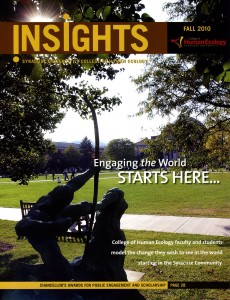An abridged version of the following article appeared in the Fall 2010 Insights, a magazine published quarterly in support of the research efforts and activities taking place at the College of Human Ecology; Syracuse University; Syracuse, New York. The Foundation would like to thank Michele J. Barrett, Communications Manager for the College of Human Ecology, for providing us permission to reprint this article and accompanying images. (Hyperlinks have been added and my comments are in brackets.)
Philanthropic synergy secures grant support for domestic violence research as social work professor looks to bridge gaps between theory, policy, and practice
“It’s not often that a fishing trip turns into a long-term relationship between a foundation and a researcher,” explains Ken Corvo, an associate professor in the School of Social Work. In 2004, Corvo was travelling to New Mexico for a trout fishing vacation. Before leaving, he sent a copy of an article he had written to Rick Leonhardt, president of the FHL Foundation, headquartered in Albuquerque, NM.
Corvo’s article was based on his research of early life attachment disruptions of domestic violence perpetrators. Since his travels took him through the Albuquerque airport, Corvo asked Leonhardt to meet to discuss the article. Leonhardt agreed, and the FHL Foundation [hereafter “FHL”] subsequently made what was to become the first of several grants to Corvo for his research. Since 2004, these grants have included support for writing projects, national and international conference presentations, and a state-wide webcast in New Mexico to funders, policy makers, and service providers on new ways of addressing domestic violence.
In the past five years, Corvo has submitted five project proposals on domestic violence and its relationship to Attachment Theory to advance broader theoretical perspectives that could influence the serious social problem of domestic violence. All five of Corvo’s projects have been funded by FHL, and all projects to date funded by FHL have had a 100 percent success rate for publication in peer-reviewed journals and selection as conference presentations.
This summer, Corvo will present a paper, co-authored with Syracuse University colleague Ellen deLara, associate professor of social work, that has been accepted for publication in Aggression and Violent Behavior, at the International Family Violence and Child Victimization Research Conference in Portsmouth, NH. The paper is entitled, “Towards an integrated theory of relational violence: Is bullying a risk factor for domestic violence?”
“The FHL Foundation is one of the few foundations that have an explicit theory-driven approach to philanthropy. Its approach to giving is guided by the principles and ideas of Attachment Theory, as initially formulated by John Bowlby, a British psychiatrist and major figure in the history of behavioral science,” says Corvo, who was recently notified a new research project would be funded this year by the FHL Foundation.
Entitled, “The gift of the Magi: Can attachment and altruism be mobilized in treating domestic violence?” Corvo’s latest research endeavor will explore attachment and altruism as significant factors in addressing domestic violence. The project’s title purposely focuses on O. Henry’s short story, “The Gift of the Magi,” a sentimental favorite that highlights a young married couple buying secret Christmas gifts for each other on a very limited budget. Although in the end each partner is disappointed to learn the gift they’ve selected is impractical, both are pleased with the gift they received because it represents their love for one another. [Editor’s note: this project has been completed, the article has been accepted for publication, and will appear as a featured article in early 2011 in journal Partner Abuse.]
In a world where securing funding sources is perhaps more competitive than ever before, Corvo’s approach to grant-seeking might be described as “niche philanthropy.” By thoroughly researching organizations, like the FHL Foundation that are focused on the specific areas they support, researchers may find a hidden jewel in the funding world that may not award six-figure grants characteristic of larger foundations yet may be strong partners in supporting curiosity-driven or controversial areas of scholarship.
Attachment Theory initially described in John Bowlby’s trilogy, Attachment, Separation, and Loss, addresses the emergence of a distinct, competent self through bonding and other primary relational processes with a caregiver. Bowlby suggests that healthy development of self depends on positive emotional bonds, initially between a child and parents, and then eventually between adults. The attachment bond, once established, is relatively enduring.
Consequently, the emotional development of an individual and his or her ability to successfully establish relational bonds is powerfully impacted by their early experiences. Being raised by unavailable or erratic caregivers creates a pattern of attachment later in life where it can be difficult for an individual to adequately handle the demands and tasks required in their contemporary intimate relationships.
Leonhardt, a former therapist himself, believes the attachment process is not optional and launched The Frederick H. Leonhardt (FHL) Foundation to provide collaborative support in attachment education, services, and research, to eliminate barriers that impede adults, children, and animals from forming safe, secure, and nurturing attachments.
The FHL Foundation encourages and supports non-profit organizations as they endeavor to conduct research, to educate, and to provide service in the areas of attachment and attachment behavioral systems. Research efforts, such as Corvo’s, strive to uncover societal systems and structures that potentially impede safe, secure, and nurturing attachments. Corvo’s work with students in the classroom is also critical to the FHL mission as he connects domestic violence to attachment and attachment behavioral systems to increase awareness of attachment-related issues.
Earlier in his career, Corvo was a consultant for the George Gund Foundation in Cleveland, OH, where he was instrumental in developing a community-based strategy for youth violence prevention. As the former director of foundation and corporate relations for Baldwin-Wallace College in Ohio and program coordinator for the Cuyahoga County Office of Program Development where he monitored and analyzed federal and state laws and regulations to identify potential government grant programs, Corvo has a keen sense of what funders look for when selecting projects to support, which was essential in identifying the FHL Foundation as a good match.
Corvo, whose areas of academic and research specialization include family and youth violence, theory development, organizational development leadership and organizational issues in social work education, offers his expertise in proposal writing and program development to social work students, which they find valuable in the portfolio of practical social work courses available to them.
Corvo has already started his newly FHL-funded project complete with a working outline and two pages of ideas. In completing this project [which has been completed as noted above], he hopes it will help further domestic violence research. “I would like to see use of a scientific basis for treating domestic violence. Today, we know what works and what doesn’t work in treatment. Testing responses to treatment and analyzing these outcomes would be very useful,” notes Corvo.
Since their initial meeting in 2004, Corvo has continued his travels to New Mexico and has maintained an ongoing relationship with Leonhardt and the FHL Foundation. The relationship is mutually beneficial—the Foundation funds Corvo’s research while Corvo consults with Leonhardt as they explore the issues-related proposals received at the Foundation and identify ways to maximize the researchers’ scopes.
And, yes, he still tries to catch a few trout.






